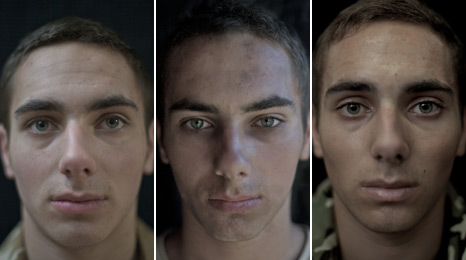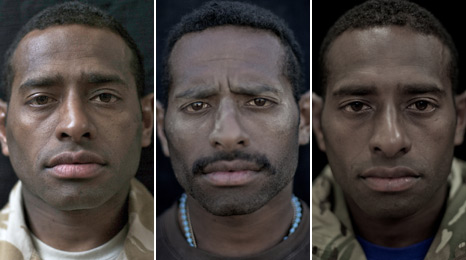British soldiers in Afghanistan ‘show effect of war’ in PTSD photos
 DOES war change you? Of course it does. But how are you changed? In Afghanistan soldier photos ‘show effect of war’, the BBC’s Dan Cairns spots photos of British soldiers from 1st Battalion the Royal Regiment of Scotland taken in the UK and Helmand province:
DOES war change you? Of course it does. But how are you changed? In Afghanistan soldier photos ‘show effect of war’, the BBC’s Dan Cairns spots photos of British soldiers from 1st Battalion the Royal Regiment of Scotland taken in the UK and Helmand province:
The heavy toll of fighting in Afghanistan can be seen in a set of photos showing UK soldiers before, during and after their tour of duty.
Is it just the fighting that has taken its toll? The soldiers are young. They have been a long way from home and living in a war zone. They have been at work 24 hours a day, seven days a week.
The photographs were taken by Lalage Snow who first encountered the soldiers during their training. She took their photos. Three months later Lalage met them in Helmand province and took more pictures.
Says Snow:
“I was really shocked at how different they looked: Red-rimmed eyes, beards, really gaunt and thin, brown, and full of sand. It really shocked me.”
Do the photograph’s convey that change? The eyes in the later photos are more narrowed. The expression is less upward. The dirt is visible.
Snow adds:
“That’s the external manifestation of the scars they bear – it’s written in their faces… They had grown up a lot. Instead of on training – where they might have been mucking around a bit more – out there it seemed to make them wake up a bit more. They were thinking: ‘This is real, this is what I’m doing. This is my job – okay get on with it.'”
 You might not see what Snow sees. But these photos are geared to deliver a message.
You might not see what Snow sees. But these photos are geared to deliver a message.
The main aim of the photos is to shed extra light on post-traumatic stress disorder (PTSD), a subject that’s been covered by Newsbeat.
None of those photographed is suffering from the condition. Lalage Snow says she wanted to highlight how PTSD can emerge years after combat.
Snow adds:
“The thing that is most important from the project is the PTSD thing, which I don’t think many people are aware of. Boys in the Balkans are now getting PTSD, wars from 10-15 years ago.”
We are aware of it. We know that even dogs in a combat situation suffer from it. But like all mental illnesses, until you live with it, it is a mystery, a phrase with no visible emblem to hang your hat on. PTSD is another mental illness to ignore and downplay. The debate should have moved on to how best the condition can be treated or avoided. A study examined why US soldiers have far higher rates of post-traumatic stress disorder than the British:
U.K. rules prohibit soldiers from spending more than 13 months in combat during a three-year period, and average tours of duty are six months—half the length of American soldiers’. Even more important are programs that send U.K. soldiers for a few days of “third location decompression” on the island of Cyprus before returning them to their home communities. “One to four days of R&R on a Mediterranean island with members of the same fighting unit apparently helps veterans come home with an easier mind…”
 Sgt. Ryan Beginof the Us military uses marijuana – and using it makes him a criminal:
Sgt. Ryan Beginof the Us military uses marijuana – and using it makes him a criminal:
At one point, Begin, diagnosed with PTSD shortly after coming home, was taking more than 100 pills a day. So many that he would stuff dozens of bottles into a backpack to lug everywhere he went. Now, he’s cut his dependency on prescriptions to zero. Their replacement? Five joints a day.
“Using marijuana balances me out,” he says. “It takes those peaks and valleys of PTSD and it softens them. It makes my life manageable.”
Use what you can. You work for the military but they do not own your life. PTSD is mental illness. Treat it as you would a lost eye or a severed limb. Give them help when they want it…
Posted: 13th, January 2012 | In: Reviews Comment | TrackBack | Permalink


